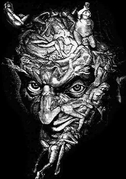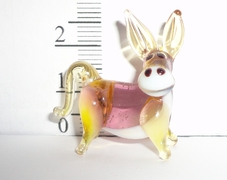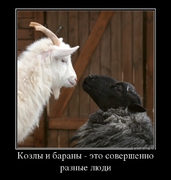Лучший ответ
Ответы
-
13 1
blblblbl 8 (115616)815121 11 лет
А кто ты такая, чтоб тебя убеждать? ) Кому ты нужна? Пойду встречаться с ласковыми нежными девушками, радостными и удивительными. Которые считают мужчину за мудрого главу семьи, защитника, любовника и добытчика. Переубеждать - значит в какой-то мере оправдываться.
Если тебе только такие встречались, значит ты таких выбираешь. Каждый тянется к тому, что ему ближе. Злые видят вокруг злых людей. Добрые подсознательно тянутся к добрым и любящим. Знакомая девчёнка, её с детства папа очень любил. Так и выросла таким маленьким солнышком. Улыбается миру, её просто подсознательно невозможно не любить.
Хотя и не красавица особая.
А другая выросла в семье где вечные крики. И вот постоянно мне рассказывает, как тот её парень оказался таким моральным уродом что прям невозможно. И этот и этот.. и на работе сотрудники-сотрудницы.. ну невозможно. А она прям всегда не при чём) И по рассказу вроде выходит так.. но как-то закрадываются смутные сомнения, а не рассказывает она то же про меня другим?))
-

-
8 0
Strix (39) 6 (10781)2957 11 лет
мы все козлы. на работе одни идиоты. политики придурки. в троллейбусах чертовы бабки. денег мало. котики умирают.
nobody belongs anywhere, everybody's gonna die.
так лучше? убеждаются на примерах. единственный способ не разочаровываться в людях - относиться к ним как к котикам, в тапок не насрал и уже хорошо.
-
6 0
FighteR (36) 7 (88399)727969 11 лет
,как вы убедите меня в томУбедить или разубедить?не все мужики козлы?Вряд ли женщина назовёт отца, брата, дедушку, сына козлом. Не так ли?
Козлы, бараны, ослы... а на каком этапе теряется "любимый"?Когда указываешь пальцем на других, посмотри что три других пальца указывают на тебя...
-
5 0
Гоша Кошкин (64) 7 (42662)48121 11 лет
Козлы - это лишь некоторые, есть ещё бараны, ослы, олени и лоси.
Я скорей всего таки лось. Ну что выросло, то выросло, нас не переделать.
Да просто потому что все мы созданы из одинаковых пороков, как-то так

-
3 0
givemechrist 6 (12262)625165 11 лет
если тебе не везёт выбором, то тут стоит задуматься о себе , а не о всех других вокруг

-

-

-

-
1 0
Relax_ (38) 7 (28811)735191 11 лет
Я надеюсь, что с таким подходом тебе будут попадаться одни козлы).
А, кст, что насчёт своего папы думаешь? Он ведь мужчина.
-
1 0
Iddqdidclip 6 (8870)3322 11 лет
Начнем по порядку.
Козёл
Представитель подсемейства козьих (лат. Caprinae) семейства полорогих (лат. Bovidae) подотряда жвачных (лат. Ruminantia) отряда парнокопытных (лат. Artiodactyla)
Животное сравнительно крупных размеров. Длина тела самца более 150 см, высота в холке около 100 см, вес достигает более 100 кг (самки 50—60 кг). Тело крепкое, жилистое, поросшее шерстью. Рога обычно изогнуты дугообразно. У самки рога слабее и короче. У самца имеется клиновидная борода около 20 см длиной. Борода является важным элементом узнаваемости козла. У козла имеются отличия в зимнем и летнем окрасе.
========================
Если найдено что-то общее с мужиком(или с человеком в целом), то дальше говорить смысла нет.
-

-

-
0 0
Mr. Red Devil (33) 5 (3292)27 11 лет
Даже если и убедить, то все-равно нет никаких гарантий что тебе не будут такие попадаться.

-

-
0 0
Orua888 6 (7372)327178 11 лет
Козлы это пахнет от них плохо? Или что?
Так это не от всех пахнет.
Это наверно только к Вам липнут козлы.
Надо задуматься.Себя проанализировать.
-
0 0
Noctis (34) 6 (8165)437148 11 лет
мы козлы и каждый день расстраиваем вас,тем что громко дышим или вообще существуем

-

-

-
0 0
christinca 7 (24700)479303 11 лет
Рыбак рыбака видит из далека, так и с козлами/лосями/людьми...

-

-

-

-
2 3
buba 5 (3168)26 11 лет
никак не будем убеждать...
правда жизни такка что - сделал дело - одел штаны - и пока - до следующего раза во вторник
-
0 1
Andrja 5 (2624)410 11 лет
Let's look at a very
young child's first encounter with a dog. Because it's a first-time experience, the child's mental
environment is a clean slate, so to speak, with respect to dogs. He won't have any memories and
certainly no distinctions about a dog's nature. Therefore, up to the moment of his first encounter, from
the child's perspective, dogs don't exist. Of course, from the environment's perspective, dogs do exist
and they have the potential to act as a force on the child's senses to create an experience. In other
words, dogs expressing their nature can act as a cause to produce an effect inside the child's mental
environment. What kind of effect are dogs capable of producing? Well, dogs have a range of
expression. By range of expression I mean dogs can behave in a number of ways toward humans.
They can be friendly, loving, protective, and fun to play with; or they can be hostile, mean, and
dangerous—just to name a few of the many behaviors they're capable of. All of these traits can be
observed, experienced, and learned about. When the child sees the dog for the first time, there is
absolutely nothing in his mental environment to tell him what he is dealing with. Unfamiliar, unknown,
and unclassified environmental information can generate a sense of curiosity—when we want to find
out more about what we're experiencing—or it can generate a state of confusion, which can easily turn
to fear if we can't place the information into an understandable or meaningful organizational
framework or context. In our example, the child's sense of curiosity kicks in and he rushes to the dog to
get more sensory experience.
Notice how children are literally compelled to thrust themselves into a situation they know nothing
about. However, in this example, the environmental forces at hand do not react favorably to the child's
advances. The dog the child is interested in is either inherently mean or having a bad day. In any case,
as soon as the child gets close enough, the dog bites him. The attack is so severe that the dog has to be
pulled off the child. This kind of unfortunate experience is certainly not typical, but it's not that
uncommon either. I chose it for two reasons: First, most people can relate to it in some way either from
their own direct experience or through the experience of someone they know. Second, as we analyze
the underlying dynamics of this experience from an energy perspective, we're going to learn about
1) how our minds are designed to think,
2) process information,
3) how these processes affect what we experience and
4) our ability to recognize new possibilities.
I know this mav seem like a lot of insieht from iust one example, but the principles involved apply to
the dynamics beneath virtually all learning. As a result of being physically and emotionally
traumatized, the little boy in our example now has a memory and one distinction about the way dogs
can express themselves.
If the boys ability to remember his experiences is normal, he can store this incident in a way that
represents all of the senses the experience had an impact on: For example the attack can be stored as
mental images based on what he saw, as well as mental sounds representing what he heard, and so on.
Memories representing the other three senses will work the same way.
However, the kind of sensory data in his memory is not as important as the kind of energy the sensory
data represents. We basically have two kinds of mental energy: positively charged energy, which we
call love, confidence, happiness, joy, satisfaction, excitement, and enthusiasm, to name a few of the
pleasant ways we can feel; and negatively charged energy, representing fear, terror, dissatisfaction,
betrayal, regret, anger, confusion, anxiety, stress, and frustration, all representing what is commonly
referred to as emotional pain. Because the boy's first experience with a dog was intensely painful, we
can assume that regardless of what senses were affected, all of his memories of this experience will be
in painful, unpleasant feeling, negative energy.
Now, what effect will this negatively charged mental energy have on his perception and behavior if and
when he encounters another dog? The answer is so obvious that it may seem ridiculous even to ask, but
the underlying implications are not obvious, so bear with me. Clearly, the moment he comes into
contact with another dog, he will experience fear. Notice that I used the word "another" to describe the
next dog he has any contact with. What I want to point out is that any dog can cause the boy to feel
fear, not just the one that actually attacked him. It won't make a bit of difference if the next dog he
comes into contact with is the friendliest dog in the world, one whose nature is only to express
playfulness and love. The child will still be afraid, and furthermore, his fear could quickly turn to
unrestrained terror especially if the second dog (seeing a child and wanting to play) attempts to
approach him. Each of us has at one time or another witnessed a situation in which someone was
experiencing fear, when from our perspective there wasn't the least bit of danger or threat. Although we
may not have said it, we probably thought to ourselves that this person was being irrational.
Mark Douglas



